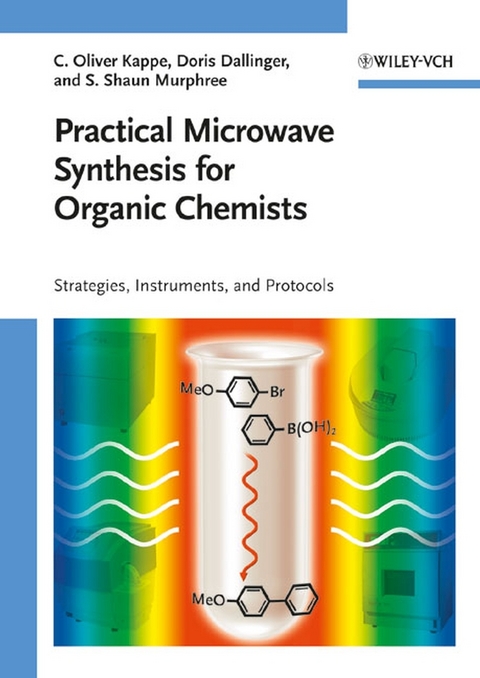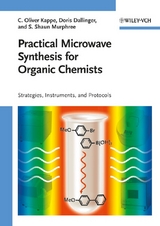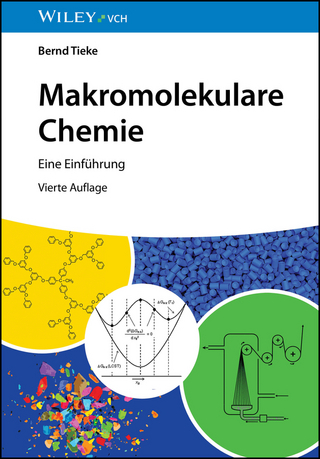Practical Microwave Synthesis for Organic Chemists
Wiley-VCH (Verlag)
978-3-527-32097-4 (ISBN)
- Titel ist leider vergriffen;
keine Neuauflage - Artikel merken
C. Oliver Kappe is Associate Professor of Organic Chemistry and Director of the Christian Doppler Laboratory for Microwave Chemistry at the University of Graz, Austria, where he also received his doctorate in 1992. After postdoctoral research work with Professor Curt Wentrup at the University of Queensland in Brisbane, Australia, and with Professor Albert Padwa at Emory University in Atlanta, USA, he returned to the University of Graz, obtaining his lecturing qualification in 1998. He has been a visiting scientist/professor at the Scripps Research Institute in La Jolla, USA, and at the Tokyo Institute of Technology in Japan. Professor Kappe's current research focuses on microwave-assisted synthesis and continuous flow processing. Doris Dallinger studied chemistry at the University of Graz, Austria, obtaining her diploma in the field of solid phase organic synthesis in 2001. She continued with a PhD under Prof C. Oliver Kappe on projects related to microwave chemistry and high-throughput synthesis. After receiving her doctorate in 2005, she joined the Christian Doppler Laboratory for Microwave Chemistry at the University of Graz as a postdoctoral research associate and is currently working on projects related to specific microwave effects and the scale-up of microwave-assisted reactions. S. Shaun Murphree is Associate Professor of Chemistry at Allegheny College in Meadville, Pennsylvania, USA. He received his bachelor's degree in chemistry from Colgate University in Hamilton, NY, and his doctorate in organic chemistry from Emory University in Atlanta, GA, under the direction of Professor Albert Padwa. He subsequently pursued post-doctoral study under Professor Peter Jacobi at Wesleyan University in Middletown, CT. After seven years in R&D at Bayer Corporation, he returned to academia in 1999, including a sabbatical at the Christian Doppler Laboratory for Microwave Chemistry at the University of Graz, Austria.
1 Microwave Synthesis - An Introduction 1
2 Microwave Theory 11
3 Equipment Review 45
4 Microwave Processing Techniques 87
5 Starting With Microwave Chemistry 163
6 Experimental Protocols 205
6.1 General Small-Scale Sealed-Vessel Microwave Processing 207
6.2 Reaction Optimization 234
6.3 Library Generation 239
6.4 Reaction Scale-Up 251
6.5 Special Processing Techniques
"The authors present a good over view of the tools and methods for micro wave-assisted organic synthesis (MOAS)." ( The C atalyst , 1 February 2012)
"The authors have produced a gem of a book, and in an area where coherent practical training is lacking, this book is a welcome addition." ( Development and Change July, 2009)
"I read this book with pleasure.... I am sure that this excellent guide will become the standard reference work in the field and clearly is a must have for anybody getting started with microwave-assisted organic chemistry." ( Angewandte Chemie International Edition , April 2009)
| Erscheint lt. Verlag | 26.11.2008 |
|---|---|
| Sprache | englisch |
| Maße | 170 x 240 mm |
| Gewicht | 714 g |
| Themenwelt | Naturwissenschaften ► Chemie ► Organische Chemie |
| Schlagworte | catalysis • Chemie • Chemische Synthese • Chemistry • Katalyse • Methods - Synthesis & Techniques • Methods - Synthesis & Techniques • Organic Chemistry • Organische Chemie • Organische Chemie / Methoden, Synthesen, Verfahren • Organische Synthese |
| ISBN-10 | 3-527-32097-0 / 3527320970 |
| ISBN-13 | 978-3-527-32097-4 / 9783527320974 |
| Zustand | Neuware |
| Haben Sie eine Frage zum Produkt? |
aus dem Bereich




